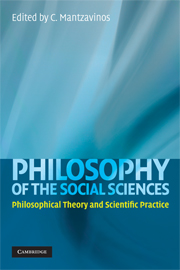Book contents
- Frontmatter
- Contents
- List of Contributors
- Acknowledgements
- Introduction
- Part I Basic Problems of Sociality
- 1 Language and Social Ontology
- Comment
- 2 Shared Agency
- Comment
- 3 The Reality of Group Agents
- Comment
- Part II Laws and Explanation in the Social Sciences
- Part III How Philosophy and the Social Sciences Can Enrich Each Other: Three Examples
- Epilogue
- Name Index
- Subject Index
- References
2 - Shared Agency
Published online by Cambridge University Press: 05 June 2012
- Frontmatter
- Contents
- List of Contributors
- Acknowledgements
- Introduction
- Part I Basic Problems of Sociality
- 1 Language and Social Ontology
- Comment
- 2 Shared Agency
- Comment
- 3 The Reality of Group Agents
- Comment
- Part II Laws and Explanation in the Social Sciences
- Part III How Philosophy and the Social Sciences Can Enrich Each Other: Three Examples
- Epilogue
- Name Index
- Subject Index
- References
Summary
Human beings act together in characteristic ways. Forms of shared activity matter to us a great deal, both intrinsically – think of friendship and love, singing duets, and the joys of conversation – and instrumentally – think of how we frequently manage to work together to achieve complex goals. My focus will be on activities of small, adult groups in the absence of asymmetric authority relations within those groups. My approach begins with an underlying model of individual planning agency, and then seeks a conceptual and metaphysical bridge from such individual planning agency to modest forms of sociality.
Shared Intention
Suppose you and I are painting a house together. What makes this a shared intentional activity? We could imagine a contrast case in which we each intentionally go through the same motions as we do when we paint the house together, and yet there is no shared intentional activity. Perhaps we are each set only on our individual painting project and respond to each other only with an eye to avoiding collisions. Echoing Wittgenstein's question about the difference, in the individual case, between my arm's rising and my raising it, we can ask: what is the difference between such a contrast case and shared intentional activity? In the case of individual human action we can see the difference as involving an explanatory role of relevant intentions of the individual agent.
- Type
- Chapter
- Information
- Philosophy of the Social SciencesPhilosophical Theory and Scientific Practice, pp. 41 - 59Publisher: Cambridge University PressPrint publication year: 2009
References
- 31
- Cited by



